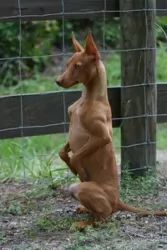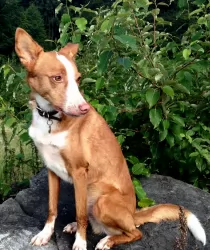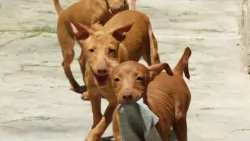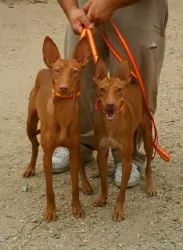 MyDogBreeds
MyDogBreeds Podenco Andaluz is originated from Spain but Pembroke Welsh Corgi is originated from United Kingdom. Podenco Andaluz may grow 23 cm / 10 inches higher than Pembroke Welsh Corgi. Podenco Andaluz may weigh 8 kg / 18 pounds more than Pembroke Welsh Corgi. Podenco Andaluz may live 3 years less than Pembroke Welsh Corgi. Both Podenco Andaluz and Pembroke Welsh Corgi has same litter size. Podenco Andaluz requires Low maintenance. But Pembroke Welsh Corgi requires Moderate maintenance
Podenco Andaluz is originated from Spain but Pembroke Welsh Corgi is originated from United Kingdom. Podenco Andaluz may grow 23 cm / 10 inches higher than Pembroke Welsh Corgi. Podenco Andaluz may weigh 8 kg / 18 pounds more than Pembroke Welsh Corgi. Podenco Andaluz may live 3 years less than Pembroke Welsh Corgi. Both Podenco Andaluz and Pembroke Welsh Corgi has same litter size. Podenco Andaluz requires Low maintenance. But Pembroke Welsh Corgi requires Moderate maintenance
 The Podenco Andaluz hails from the Andalusian region of southern Spain. It is believed that this dog is likely to have descended from the European hunting dog.
The Podenco Andaluz hails from the Andalusian region of southern Spain. It is believed that this dog is likely to have descended from the European hunting dog.
Because of the lack of distinctive characteristics, and also the similarities the dog shares with other dog breeds, the dog isn’t typically recognized in its own right. They have always been used as hunting dogs. The Andaluz is actually one of the lesser known Podencos and it isn’t recognized by the FCI.
 The Pembroke Welsh Corgi is known as an achondroplastic, a dwarf breed, and they come from Pembrokeshire in Wales. Not much is known of the dog's history but it is believed that the dogs came over with Flemish weavers who settled in Pembrokeshire way back in the 12th century already.
The Pembroke Welsh Corgi is known as an achondroplastic, a dwarf breed, and they come from Pembrokeshire in Wales. Not much is known of the dog's history but it is believed that the dogs came over with Flemish weavers who settled in Pembrokeshire way back in the 12th century already.
This dog breed has always been a cattle herding dog. Their fame has come from them being a favorite dog breed for the British royals and particularly of Queen Elizabeth II.
 There are three different Andalusian Hounds - small, medium and large, but for the sake of space, we refer to the medium sized dog. The medium sized dog stands at between 42 and 53cm and weighs roughly 20 – 22kg.
There are three different Andalusian Hounds - small, medium and large, but for the sake of space, we refer to the medium sized dog. The medium sized dog stands at between 42 and 53cm and weighs roughly 20 – 22kg.
The dog has short hair, large erect ears and a long tail. Regarding color, most of these dogs are a reddish brown or plain brown color with some having patches of white.
The Andaluz is a dog which is reserved with strangers, but with their owners they are loyal and loving and never aggressive. The Andaluz is considered a one-man dog but he is more than capable of showing love and affection for all members of his human family.
This dog will benefit from training and socialization as this makes him more sure of himself and more obedient. He is an intelligent dog and won’t battle to learn simple commands. You’ll find your Podenco Andaluz to be sweet, calm and gentle indoors with training. He loves to lie close up to you,preferably on the couch right next to you!
 The Pembroke Welsh stands at between 25 and 30cm in height and weighs between 11 and 14kg.
The Pembroke Welsh stands at between 25 and 30cm in height and weighs between 11 and 14kg.
The coat is thick and shortish and can be fawn or a mix of colors such as white, cream, tan and black. The coat sheds quite a bit. Some of these dogs are born with their tail naturally short while others have the tail docked to give it that distinct look.
Pembroke Welsh Corgis are loving dogs and with their human families, they want to become involved with their lives. They like to please their owners and are therefore easy to train and socialize, becoming very obedient and amicable.
They’re alert, intelligent dogs and make great watchdogs too. They get on well with other pets in the home as well as children.
 This dog has always been a hunting dog, and an excellent one at that. These days he is also a companion animal. It is very sad that these dogs have been given a cruel deal in Spain.
This dog has always been a hunting dog, and an excellent one at that. These days he is also a companion animal. It is very sad that these dogs have been given a cruel deal in Spain.
For those that make it into a loving home, they have proved to make excellent low maintenance dogs who are willing to provide their human family with faithful love and companionship that only a dog can provide.
 British royalty has always loved the Pembroke Welsh Corgi and why not? He is loving, energetic, feisty, gentle, calm, friendly and intelligent.
British royalty has always loved the Pembroke Welsh Corgi and why not? He is loving, energetic, feisty, gentle, calm, friendly and intelligent.
Able to adapt to life in the city or the countryside, he will however need to be exercised every day as he has always been a herding- and working dog, used to working.
If you’re willing to bring the Pembroke Welsh Corgi into your home, he’ll show you what a splendid pet and companion he can be for you too.
 Your Podenco Andaluz is a robust dog breed and doesn’t battle with any health conditions. However, having said that, every dog can battle with some of the more common dog illnesses, and then your dog may well have to visit the vet.
Your Podenco Andaluz is a robust dog breed and doesn’t battle with any health conditions. However, having said that, every dog can battle with some of the more common dog illnesses, and then your dog may well have to visit the vet.
Remember, that to give your dog the best chance, the dog should receive vaccinations to protect him from some life-threatening diseases.
This disease is brought about by the protozoan parasite Leishmania. The dog gets into trouble with this disease when sand-flies transmit parasites into the skin of the dog. The disease spreads to most organs, with kidney failure being the most common cause of death.
This is a fatal disease that is contracted through the bite of an infected mosquito. It is serious and will require veterinary intervention as its a disease that can create problems with the animal’s heart.
This is a fatal viral disease that can be passed on to your pet and affects the central nervous system. A dog with rabies is nearly always a dead dog, sadly. Symptoms include excess drooling, aggression and seizures.
 Pembrokes can live to be between 12 to 15 years. With good care they can live to be a ripe old age, but just like with any other dog, they can become ill with any of the many common dog illnesses there are.
Pembrokes can live to be between 12 to 15 years. With good care they can live to be a ripe old age, but just like with any other dog, they can become ill with any of the many common dog illnesses there are.
Some of these diseases are hip dysplasia, monorchidism and degenerative myelopathy. Being a small or short dog, they are also prone to obesity.
This is a condition where only one testicle descends and the other isn’t able to descend into the scrotum. Both testicles should be in the scrotum by 2 months of age. Monorchidism is usually genetic and you may find your dog licking his genital area quite a bit.
If you suspect your dog has monorchidism, you will need to make an appointment with your veterinarian.
This is a progressive disease of the spinal cord and is usually seen in older dogs, starting with your dog losing coordination in the hind limbs.You’ll notice your dog dragging his feet.
As the disease progresses, the limbs weaken and the dog even has difficulty with standing. Eventually the dog is unable to walk. With time your pet even suffers with urinary and fecal incontinence. Fortunately it isn’t a painful disease but you will want to speak to your vet for advice.
 This has always been a hunting dog so he is used to running long distances. He is best suited to life in the countryside as opposed to life on a small property in the city. You will certainly need to take him on walks. If you are lucky enough to live near the beach, you can take bat and ball and hit the ball hard with the beach-bat, allowing your dog to race at top speed to fetch it.
This has always been a hunting dog so he is used to running long distances. He is best suited to life in the countryside as opposed to life on a small property in the city. You will certainly need to take him on walks. If you are lucky enough to live near the beach, you can take bat and ball and hit the ball hard with the beach-bat, allowing your dog to race at top speed to fetch it.
Regular brushing, at least twice a week will be required for the Podenco Andaluz. It’s a good idea to check your dog over for any odd lumps and for ticks and fleas. Keep his nails trimmed and check his ears and eyes for infection.
Every dog requires a good diet if good health and longevity are to be expected. Always check the labels of commercially manufactured dog foods to ensure that your dog gets a good dose of protein in.
The best quality foods have a good balance of vitamins and minerals in them, whereas some of the poorer quality foods have bad ingredients such as preservative, colorants and fillers.
Try and give your dog some wholesome home-made food such as boiled chicken, brown rice or pasta, sweet potatoes, spinach and carrots. Also, some raw meat occasionally will benefit your dog too, after all dogs have always been carnivores.
 If you bring a puppy home, make sure he gets his puppy vaccines at 8 weeks of age.
If you bring a puppy home, make sure he gets his puppy vaccines at 8 weeks of age.
Your puppy requires 4 meals a day. Make sure to always give your pet the best quality food there is to ensure his health. Avoid giving him spicy, human food. Dogs like simple, consistent diets which don’t upset the stomach. If you buy him commercially manufactured food, buy the best quality one that isn’t full of preservatives, colorants and fillers. Try and mix in some homemade food occasionally such as chopped up boiled chicken, brown rice or pasta and some cooked vegetables such as sweet potato, spinach and carrots. A little bit of raw meat occasionally will do wonders for your pet and he will have more energy, a shinier coat, less skin allergies and less inflammation.
Always ensure your pet has a constant supply of fresh, cool water.
Brush the Pembroke Welsh Corgi’s hair twice a week. Feel for any unusual lumps while doing this. Check inside and outside his ears for ticks and fleas and ear infections.
Trim his nails.
Make sure if he goes outside that he has a shady spot to lie down in.
Exercise him. Take him on walks.
Give him your love and attention.
Take him to the vet when you can see that he is sick.
Have your dog spayed or neutered if you don’t intend for it to have puppies.